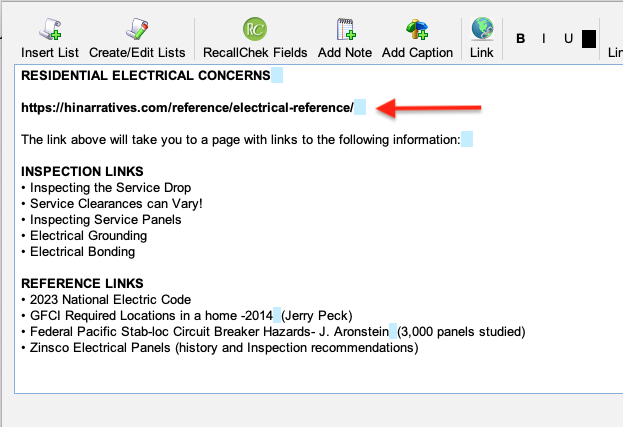The INL Residential template for Home Inspector Pro features INSPECTOR REFERENCE sections that altogether contain nearly 300 titles. It’s like having an onboard inspection encyclopedia!

Each title is connected to a URL. Pasted into your browser, it takes you to a page on my website or to a useful site like the Building Intelligence Center.
The template contains the following inspection-related titles (URLs installed in the template but not shown here)
GENERAL REFERENCE
- Becoming Familiar with this Template;
- About Links and URLs;
- Template Details; and
- The Use of “Qualified Contractor”.
ROOF REFERENCE
INTERNACHI RESOURCES
- Roof Inspection Field Guides;
- Mastering Roof Inspection Series;
- Asphalt Shingle Inspection Course;
- Tile Roof Inspection Cours;
- Wood Shake And Shingle Inspection Course; and
- Slate Roof Inspection Course.
STEEP-SLOPE REFERENCE
- Asphalt Shingle Reference;
- Chimney at The Roof;
- Composite Slate;
- Fiber-Cement Roofing;
- Flashing
- IRC Links: Steep-slope Roof Covering Materials;
- IRC Minimum Roof Pitch;
- Metal Roofs;
- Plumbing and Combustion Vents;
- Residential Drainage Systems;
- Roll Roofing;
- Roof Tile Reference;
- Skylight Exteriors;
- Stone Slate Roof;
- Underlayment; and
- Wood Shakes and Shingles.
LOW-SLOPE REFERENCE
- Built-Up Roofs;
- EPDM Roof Membranes;
- Inspecting Low-Slope Roof Systems;
- IRC Links: Low-Slope Roof Covering Materials;
- Liquid-Applied Roofing;
- Modified Bitumen;
- PVC Roof Membranes; and
- TPO Roof Membranes.
ROOF STRUCTURE REFERENCE
- Roof Structure Ventilation
- Inspecting the Roof Structure; and
- Parapet Wall.
ROOF STRUCTURE EXTERIOR
- Sagging Roof Framing;
- Walking the roof.
UNDERLAYMENT
- Roofing Underlayment Types;
- Installation of Felt Underlayment; and
- Felt Underlayment Failure.
ROOF-MOUNTED VENTS
Stains Below Roof Vents
ASPHALT SHINGLES
The following are accessed by a single URL in the template:
- 2021 IRC R905.2 Asphalt Shingles;
- 66 GAF Technical Bulletins;
- About Shingle Warranties;
- Asphalt Roofing Manufacturer’s Association;
- Asphalt Shingle Inspection Concerns;
- Asphalt Shingle Inspection Field Guide, $18.99, by Kenton Shepard;
- Asphalt Shingle Sealant Strips(Donan Engineering);
- Asphalt Shingles Inspection Course;
- Batch Problems;
- Biological Growth;
- Blisters VS Hail Damage;
- Buckling of Shingles;
- Craze-cracking;
- Factors Affecting Shingle Aging;
- FM Global: Roof Inspection Resources;
- Identifying Wind Damage;
- Impact Resistance of Asphalt Shingles (Insurance Institute for Business and Home Safety);
- Inspecting Shingle Bonding Correctly;
- InterNACHI Asphalt Shingle Inspection online video course(3.25 hrs, InterNACHI members only);
- Mastering Roof Inspections ; (Asphalt Shingles (#55-#109);
- Racking of Shingles(GAF Technical Advisory Bulletin);
- Telescoping Ladder Maintenance;
- The History of Asphalt Shingles(CASMA);
- Uniform Granule Loss; and
- White/Brown Stains below Roof Vents.
CLAY and CONCRETE TILE
These are separate in the template but listed together here to avoid repetition:
- Aging And Failure Characteristics Of Clay Tile;
- Aging And Failure Characteristics Of Concrete Tile;
- Biological Growth;
- Clay Tile Classification;
- Clay Tile Inspection Concerns;
- Concrete Roof Tile Fastening;
- Concrete Tile Inspection Concerns;
- Historic Tile;
- Minimum Headlap;
- Minimum Roof Slope;
- Roof Tile Standards;
- Sidewall Flashing;
- Tile Resources;
- Tile Substrate; and
- Walking Roof Tile.
METAL ROOFS
- Definitions;
- Minimum Slope;Galvanic Corrosion;
- Fastening;
- Offset Side Joints; and
- Flashing.
SLATE ROOFS
- About Slate Roofs;
- Inspecting Stone Slate Roofs.
WOOD SHAKE and SHINGLE ROOFS
- Aging/Failure Characteristics;
- Grain Type;
- Ice Barrier;
- Interlayment VS Underlay;
- Shake Grades;
- Substrate Requirements;
- Types of Shakes;
- Types of Wood Shingles;
- Underlayment, Rainscreen, and Ice Barrier (shingles).
- Wood Roof Flashing;
- Wood Shake Inspection Concerns; and
- Wood Shingle Inspection Concerns.
ROLL ROOFING
- Installation Details
- Lifespan
FIBER-CEMENT
About Fiber-cement
BUILT-UP ROOFS
- About Built-up Roofs;
- Accessories;
- Base Sheets;
- Bitumen;
- Blisters;
- Buckling;
- Cracking;
- Inadequate Drainage;
- Inspecting Built-up Roof Membrane;
- Membrane Flashing;
- Non-Visible Transport/Storage/Application-Based Problems;
- Ply Sheets; and
- Weather-Surfacing; Cap Sheets & Flood Coat.
EPDM MEMBRANES
- About EPDM;
- EPDM Thickness & Width;
- Splicing Seams;
- Evaluation by Age; and
- Blisters.
MODIFIED BITUMEN
Inspecting Modified Bitumen
TPO MEMBRANES
- About TPO Roofing
- TPO Inspection Concerns
PVC MEMBRANES
- About PVC Roofing;
- PVC Installation Consideration; and
- PVC Inspection Concerns.
SPRAYED POLYURETHANE ROOFING
SPF Inspection Concerns
EXTERIOR REFERENCE
GROUNDS
- Grade;
- Planters; and
- Retaining Walls.
TREE REFERENCE
- Tree Parts and their Functions;
- Evaluating Trees.
EXTERIOR WALLS
BRICK REFERENCE
- Brick Veneer VS Solid Masonry Walls;
- Cracking;
- Spalling Brick; and
- Brick Staining.
COMPOSITE SIDING REFERENCE
Inspecting Composite Siding
FIBER-CEMENT REFERENCE
Inspecting Fiber-Cement
STUCCO REFERENCE
Inspecting Stucco
VINYL REFERENCE
Inspecting Vinyl Siding
WOOD SIDING REFERENCE
Inspecting Wood Siding
STONE VENEER REFERENCE
Inspecting Stone Veneer
STRUCTURE REFERENCE
GENERAL STRUCTURE
The following are accessed by a single URL in the template:
- Notching and Boring Guides for sawn and engineered lumber, studs, joists, beams, and Glulams;
- Adjustable Steel Posts;
- Wood deterioration and Decay;
- Simpson Strong Tie Wood Connectors catalog (you may need to update this link occasionally);
- Floor Structure Checklist;
- Shear Walls;
- Crack Analysis;
- Expansive Soil;
- Crack Analysis;
- Expansive Soil;
- Post-fire Assessment of Framing; and
- Building Science Corporation.
ATTIC
- Attic Access;
- Personal Protective Equipment;
- If You Can’t Enter the Attic;
- Attic Conditions;
- Attic Thermal Envelope;
- Attic Electrical;
- Attic Plumbing;
- Attic HVAC; and
- Roof Structure Ventilation.
- Evaluating Fire Damage.
ROOF FRAMING REFERENCE
- Inspecting the Roof Structure;
- Roof Structure Ventilation;
- Conventional Roof Framing;
- Structural Ridges
- Collar ties VS Rafter Ties
- Truss Roof Framing;
- Fasteners for Metal Connectors;
- Roof Framing Fastener Schedules;
- Roof Sheathing;
- H-clips are not always required; and
- Evaluating Fire Damage.
EXTERIOR WALL REFERENCE
About Shear Walls
FOUNDATION REFERENCE
- Foundation Cracking;
- Resistance To Shrinkage;
- Efflorescence/ Subflorescence;
- Cone Of Compression; and.
- Other Foundation Issues
FLOOR STRUCTURE
Floor Structure Inspection Concerns
INTERIOR REFERENCE
GENERAL INTERIOR REFERENCE
- About Mold;
- About Radon;
- Radon Certification;
- Smoke Alarms;
- Carbon Monoxide (CO) Alarm;
- Thermal Pane Window Failure;
- Chimney/Fireplace Inspection Liability;
- Gas Fireplace Inspection;
- Wood-Burning Fireplace/Stove/Chimney Inspection;
- Asbestos; and
- Lead Paint.
The following are accessed by a single URL in the template:
- Kitchen inspection;
- Stairway inspection;
- Wood floor inspection;
- Door inspection;
- Window inspection;
- Thermal pane failure; and
FLOORING REFERENCE
Inspecting Hardwood Floors
DOOR REFERENCE
- Door Inspection Concerns;
- Sliding Glass Doors; and
- Closet Doors.
WINDOW REFERENCE
- General Window Inspection Concerns
- Thermal Pane Failure
KITCHEN REFERENCE
Kitchen Inspection Checklist
STAIRWAY REFERENCE
- Stairway Inspection Concern;
- Staircase Requirements Vary!; and
- Baluster Spacing; Sloped Guards Vs Level Guard.
ELECTRICAL REFERENCE
GENERAL ELECTRICAL REFERENCE
- Residential Electrical Concerns;
- GFCI Location Requirements;
- Electrical Panel Working Clearances;
- Overhead Service Clearances (Nec);
- Concerns with Neutrals;
- Fused Disconnect with a Load Center; and
- Conductor Type.
ELECTRICAL SERVICE/METER
- Inspecting the Service Drop
- Service Clearances can Vary!
- Electric Meter Minimum Height
SERVICE PANEL REFERENCE
SERVICE PANEL CONCERNS
- Types of Electrical Panelboards
- Panel Working Clearances
- Conductor Types
- Fused Disconnect with a Load Center
- Dangers of Fused Neutrals
- Backfed Disconnects
- Bonding Bushings
- When Does an Outbuilding Need Its Own Grounding Electrode?
The following are accessed by a single URL in the template:
INSPECTION LINKS
- Inspecting Service Panels
- Electrical (service and equipment) Grounding
- Electrical Bonding (inside and outside panels)
REFERENCE LINKS
- 2023 National Electric Code
- GFCI Required Locations in a home -2014 (Jerry Peck)
- Federal Pacific Stab-loc Circuit Breaker Hazards- J. Aronstein (3,000 panels studied)
- Zinsco Electrical Panels (history and Inspection recommendations)
SUBPANEL REFERENCE
- Subpanel Inspection Concerns
- Floating Neutral Bus Bar
BRANCH WIRING REFERENCE
- Testing GFCI Outlet
- GFCI Location Requirements and Enactment Year
- Ungrounded 3-Prong Outlets
The following are accessed by a single URL in the template:
- AFCI Protection;
- GFCI Protection;
- Conductor Types;
- Ungrounded 3-prong Receptacles;
- Bootleg Grounds;
- Neutral Conductor Concerns;
- Sub-panel: Floating Neutral Bus Bar;
- Bootleg Grounds; and
- Smoke Alarms.
PLUMBING REFERENCE
GENERAL PLUMBING REFERENCE
- Water Heater Inspection Concern;
- Gas Pipe Distribution Materials and CSST;
- Water Distribution Pipes;
- Inspecting Private Water Wells; and
- About Inspecting Septic Systems.
WATER HEATER REFERENCE
- Water Heater Inspection Checklist;
- Water Heater Backdrafting: Causes and Recognition;
- Tpr Discharge Piping Regulations;
- Gas Venting Basics;
- Formula for Calculating Adequate Combustion Air;
- Water Heater Tips;
- Why Water Tanks Leak;
- Discolored Hot Water; and
- Venting High-Efficiency Combustion Appliances into Masonry Chimneys.
SEPTIC SYSTEMS
Inspecting Septic Systems
HEATING
GENERAL HEATING REFERENCE
- Combustion Exhaust Venting Basics;
- Combustion Air Requirements;
- Finding the Date-Of-Manufacture;
- About Carbon Monoxide;
- Heating System Efficiency;
- By-Passing Unfamiliar Thermostats;
- Formula for Calculating Adequate Combustion Air;
- Temperature Stratification in Multi-Story Homes;
- Inspecting Heat Pumps; and
- Inspecting Mini-splits.
FURNACE REFERENCE
- Gas Furnace Inspection Concerns;
- Gas Furnace Operation;
- Identifying a Cracked Heat Exchanger; and
- Furnace Efficiency Ratings.
BOILER REFERENCE
- Inspecting Gas-fired Boilers
- TPR Discharge Pipe Regulations
COOLING
GENERAL COOLING REFERENCE
- Temperature Stratification in Multi-Story Homes;
- Inspecting Heat Pumps;
- Inspecting Mini-splits.
LOG HOME REFERENCE
- Inspecting Log Homes;
- Log Wall Settling & Shrinkage;
- Measuring Log Moisture Content;
- Log Checking;
- About Chinking;
- Inspecting Chinking; and
- Wood Decay.
